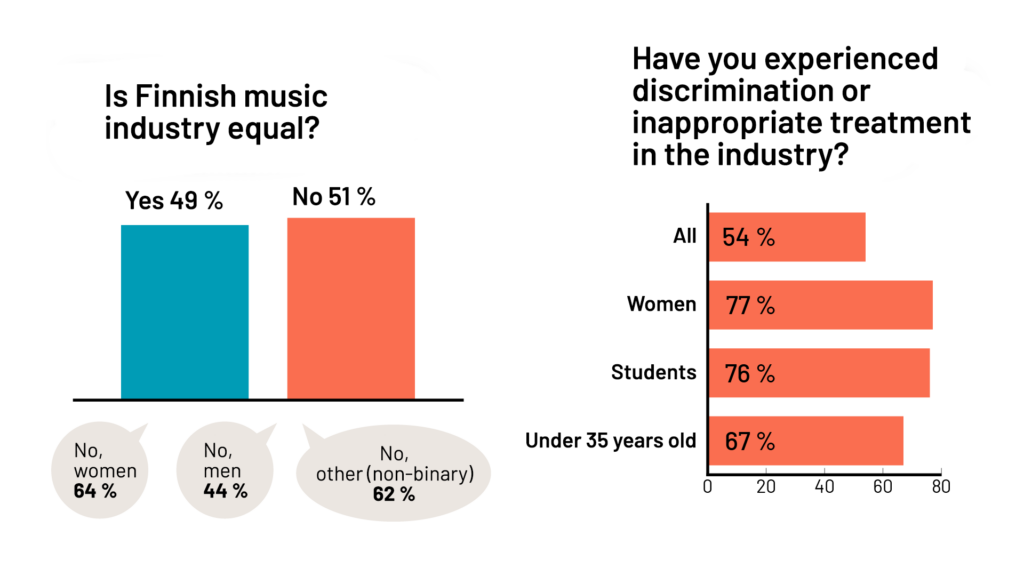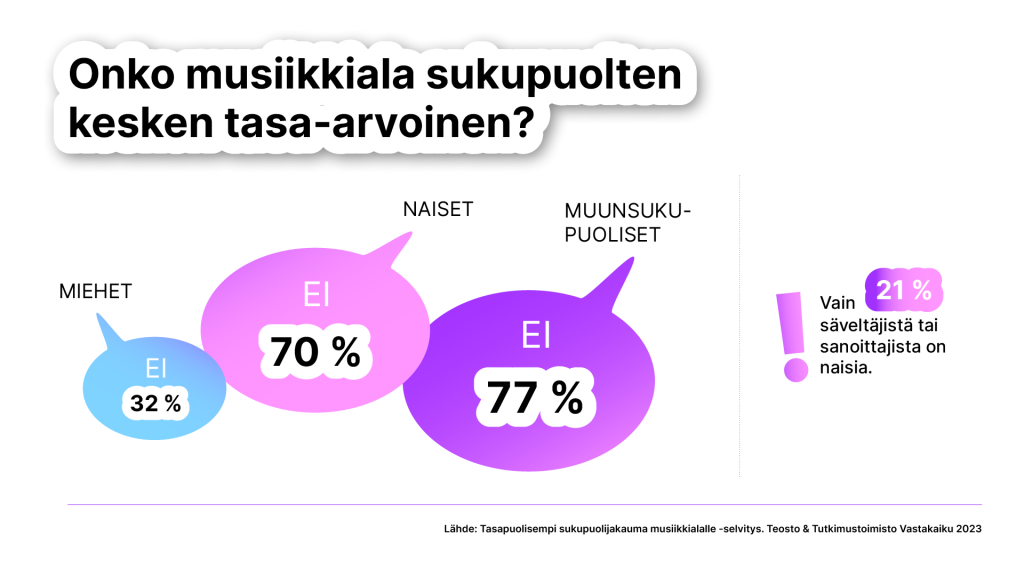Discrimination in the music industry still prevalent – discrimination based on ethnicity, age or gender is especially common

Discrimination and inappropriate treatment are still prevalent in the Finnish music industry. For example, up to 61% of individuals belonging to ethnic minorities reported experiencing discrimination based on their background. Industry professionals are calling for more open discussion about racism and discrimination, as well as clearer practices to prevent it.
In February and March, Teosto conducted a survey to assess the state of equality and discrimination in the music industry. The survey collected information about experiences of discrimination among different groups and their impact on the development of the music industry.
A total of 914 individuals working in the music industry responded to the survey. The majority of respondents were music composers, lyricists or performers. The vast majority of respondents (45%) were freelancers, but responses were also widely received from employees of associations and organisations, as well as entrepreneurs.
Less than half of the respondents considered the music industry to be equal. According to the responses, discrimination and prejudice heavily burden the industry, hindering diversity and equality. On the other hand, the industry was also seen to have progressed, especially in terms of gender equality, and younger generations were considered to be more open-minded than before.
“Although progress has been made, more than half of those working in the industry have still experienced discrimination or inappropriate treatment. Experiences of discrimination are present in all professional groups within the industry, from company operators to freelancers and societies. There is still a lot of work to be done”, says Vappu Aura, Director of Communications and Public Relations at Teosto, who coordinated the research project.
According to the survey:
- Less than half (49%) of those working in the music industry consider it to be equal.
- A significant majority (54%) have experienced some form of discrimination or unfair treatment.
- Discrimination is most prevalent among ethnic minorities. 61% of individuals from ethnic minorities have experienced discrimination or inappropriate treatment due to their background.
- Two-thirds of women in the music industry have experienced gender-based discrimination or unfair treatment. Only 14% of men reported experiencing gender-based discrimination.
- Over a third of those working in the music industry have experienced age discrimination. Age discrimination is present in all age groups but is most prevalent among young people and those over 50 years old.
- Discrimination is most commonly experienced from colleagues (72% of those who have experienced discrimination).
- The most common forms of discrimination were belittlement, underestimation of expertise and lack of recognition. Half also reported being excluded or receiving inappropriate comments.
- One-third of those who had experienced discrimination reported not receiving equal remuneration for equivalent work.
- 61% of those who had experienced discrimination reported that it had a negative impact on their career development, and 41% reported that they were considering a career change due to discrimination or unfair treatment.
- Only a quarter had reported discrimination or unfair treatment to any authority.
Ethnic minorities face the most discrimination
The survey inquired about the respondent’s affiliation with various minority groups, such as sexual minorities, ethnic or linguistic minorities, or different disabled groups.
Among minorities, those belonging to ethnic minorities appear to be in the weakest position. Of these, up to 61% had experienced discrimination or unfair treatment due to their background. Additionally, over half of those belonging to a linguistic minority reported experiencing discrimination.
The open responses to the survey highlighted the concentration of power in the music industry. While individuals from ethnic minorities are somewhat visible as artists, they are not present in decision-making roles in the industry.
“Certain roles in the music industry are monopolised by specific demographic groups. For example, decision-making positions are often held by white men, and marketing and PR teams are predominantly composed of women. People of colour are hardly seen in roles other than that of an artist.”
“Because there are so few brown women in positions of power in the industry, for example, it is difficult for a brown woman to progress in the music industry when their music or life experience is not relatable to the predominantly white, older men in decision-making positions.”
Age discrimination is common in the music industry: “you are never the right age”
Experiences of discrimination differ significantly between genders. Gender-related discrimination or unfair treatment was reported by 66% of women, while similar experiences were only reported by 14% of men. Gender equality emerged as a significant issue in a survey on equality in the industry conducted last year.
Age-related discrimination was also surprisingly prevalent in music industry roles. A total of 37% of those working in the music industry had experienced age-related discrimination, but out of the women working in the industry, nearly half reported having experienced it. While experiences of age discrimination were particularly prevalent among younger generations (46%), it was also experienced across all other age groups.
“In light of the results, it seems that you are never the right age. Experienced music creators felt that age discrimination prevented them from receiving the respect and visibility they deserve. On the other hand, younger individuals face a lot of doubt regarding their skills. However, a third of middle-aged respondents had also experienced age discrimination”, notes Vappu Aura.
Room for improvement in the music industry’s work culture – most discrimination comes from colleagues
Discrimination and unfair treatment are most commonly experienced from colleagues. Up to 72% of those who experienced discrimination attributed it to their colleagues. Belittlement and underestimation of competence or skills were the most common forms of discrimination. Half of those who experienced discrimination reported being excluded or receiving inappropriate comments. A third had experienced unequal pay, and almost a third had experienced sexual harassment.
The responses raise questions about the prevailing work culture in the music industry.
“The music industry seems to lack fundamental workplace rules: how you speak to and treat others in the industry, and how you value everyone’s contribution. Despite fierce competition, one should not elevate oneself at the expense of others”, says Vappu Aura.
Respondents reported that discrimination negatively affected their work in various ways in the music industry. Of those who had experienced discrimination, 61% reported negative effects on their career development, and 41% reported that they were considering changing careers. Over a third reported experiencing various mental health problems related to anxiety, exhaustion, depression and reduced work ability.
Only a quarter of the respondents had reported discrimination or unfair treatment to anyone. The main reason for not reporting was the belief that reporting would not make a difference. Even when incidents were reported, there were often no consequences. Many also said that they did not know the appropriate authority to report to or influence the matter.
Conscious promotion of diversity is needed in the music industry
Respondents were also asked for suggestions to improve equality. According to respondents, diversity needs to be promoted consciously in the music industry. Individuals from various backgrounds, regardless of ethnicity, gender or sexual orientation, should be considered in recruitment, music production and distribution, and the distribution of various awards.
Concrete measures mentioned included positive special treatment and quotas, as well as anonymous recruitment, which was also recommended in the music industry recruitment guidelines published last year.
Much is also required in terms of education and awareness-raising. Discrimination should be openly discussed, and situations where it occurs should be highlighted. Commonly agreed-upon practices and clear procedures are still lacking in many cases. Although industry-specific guidelines for addressing harassment and unfair treatment were published in 2022, the practices do not seem to have taken root in the industry yet.
Many respondents also emphasised the need for broader cultural and societal change. Teosto’s Vappu Aura emphasises that the music industry has the opportunity to lead the way in society and set an example for others.
“This survey proves once again that the music industry is already very diverse, with a huge number of individuals from various backgrounds working in the industry. This should be a richness that increases the diversity of music and expands its dimensions. However, change is not something someone else does – it requires everyone’s effort.”
The survey was conducted by the research company Vastakaiku on behalf of Teosto.


